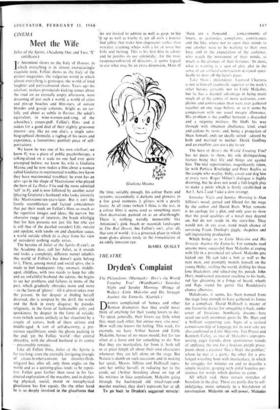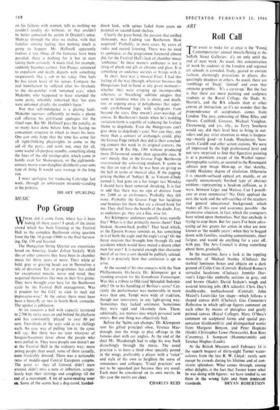THEATRE
Dryden's Complaint
DRYDEN complained of Seneca and other Roman dramatists that they could never think of anything for their young lovers to do: `To speak generally, their lovers say little when they meet each other, but anima mea, vita mea.' How well one knows the feeling. This week, for example, we have Arthur Seaton and Little Malcolm, heroes of no mean mould, but far too often at a loose end for something to do. Not that they are inarticulate, far from it, both tell us at great length all about their own characters whenever they are left alone on the stage. But Nature is dumb on such occasions and in making her speak, Messrs. Sillitoe and Halliwell repre- sent her unlike herself; in reducing her to the crude act (Arthur threshing about on top of his mistress in fake copulation, Malcolm going through the hackneyed old ritual-rape-and- murder routine), they don't represent her at all.
To go back to Dryden's suggested remedy:
`there are a thousand . . . concernments of lovers, as jealousies, complaints, contrivances and the like, where not to open their minds to one another were to be wanting to their own love, and to the expectation of the audience; who watch the movement of their minds, as much as the changes of their fortunes.' In short, what is wanting is a spot of plot, plot in the sense of an artilicial construction designed speci- fically to show off the hero's paces.
Take Shaw's philanderer. Leonard Charteris is not in himself essentially superior to the week's other heroes. certainly not to little Malcolm, but he has a decided advantage in being made much of at the centre of more jealousies, com- plaints and contrivances than were ever gathered together on one stage before: or so it seems by comparison with our usual meagre allowance. His problem is the conflict between a discarded and a reigning mistress. He bluffs his way through with inhuman ebullience, kind, cruel and callous by turns: and, being a projection of Shaw himself. ends up ideally suited---adored by both and married to neither. Derek Godfrey and an excellent cast are a joy to see.
The hero of How's the World Treating You? has no paces to show, his sole distinguishing feature being that life and things are against him. The.real opportunities, magnificently taken, lie with Patricia Routledge and Peter Bayliss as the couple who waylay. bully, cosset and dog him at every turn. Roger Milner's dialogue is highly diverting, but he does not need a full-length play to make a point which is firmly established in Act I. Acts 2 and 3 take a slow revenge.
Saturday Night and Sunday Morning is Alan Sillitoe's novel, gutted and filleted for the stage by the author and David Brett. What remains is no apology for a plot, and only goes to show that the good qualities of a novel may depend on, but do not reside in. the story-line. They would not, in any case, stand much chance of surviving Frank Dunlop's giggly, shapeless and self-ingratiating production.
Which brings us to Little Malcolm and His Struggle Against the Eunuchs. For eunuchs read anyone more successful than Malcolm at coping with life in a provincial art school. Malcolm gets kicked out. He can take a hint as well as the next man, and promptly models himself on the young Hitler. reviling the world, drilling his three lone blackshirts and rehearsing his putsch. John Hurt. mudstained greatcoat reaching to his heels, red lips glistening in a fringe of beard, wheels and flaps round his garret like Baudelaire's clumsy albatross.
Melodrama. it seems, has been banned from the stage long enough to have gathered its forces for a comeback. David Halliwell is master of one favourite device for smuggling it back, under cover of ferocious, bombastic dreams—here acted out with enormous gusto by Mr. Hurt and a brilliant supporting cast. Signs of a revived connoisseurship of language for its own sake are also confirmed in Little Malcolm. Tim Preece and Kenneth Colley. as two of Malcolm's unprepos- sessing, eager friends, drew spontaneous rounds of applause. the one for a luscious purple prose- poem about a creature 'like a black she-panther,' whom he met at a party; the other for a pro- longed wrestling bout with inarticulacy, in which he struggles for minutes on end to describe a simple incident, groping with stolid hopeless per- sistence for words which decline to come.
All which said, there remain stretches of boredom in the play. These are partly due to self- indulgence, more seriously to a breakdown of construction. Malcolm on will-power, Malcolm on his failures with women, tells us nothing we couldn't readily do without; or that couldn't be better conveyed by action in Dryden's sense. Midway through the play we realise, with that familiar sinking feeling, that nothing much is going to happen. Mr. Halliwell apparently realises it too. Once all the fantasies have been paraded, there is nothing for it but to start taking them seriously. A mock trial, for example, suddenly becomes earnest. Tim Preece, sentenced to expulsion and death, departs with something suspiciously like a sob in his voice. One feels he has taken leave of his senses. Compare the real humiliation he suffered after his threnody to the she-panther with 'untamed eyes,' when Malcolm, who happened to have attended the same party, unkindly remarked that 'her eyes were untamed alright, she couldn't focus.'
Not that self-indulgence is a glaring fault; Malcolm recovers sufficiently to make a phone call offering his girl-friend apologies for the ritual rape. But Mr. Halliwell pays the penalty, as so many have done before him, for having no convenient structure in which to insert his hero. One can only hope that the time has come for all right-thinking playwrights to come to the aid of the party. and work out, once for all, some useful all-purpose standby, something along the lines of the old revenge-plot, which came in handy even for Shakespeare, or the eighteenth- century marry-your-daughter-disinherit-your-sons type of thing. It would save wastage in the long run.
I must apologise for traducing Coleridge last week, through an unforeseen misunderstanding at the printers.
HILARY SPURLING



































 Previous page
Previous page